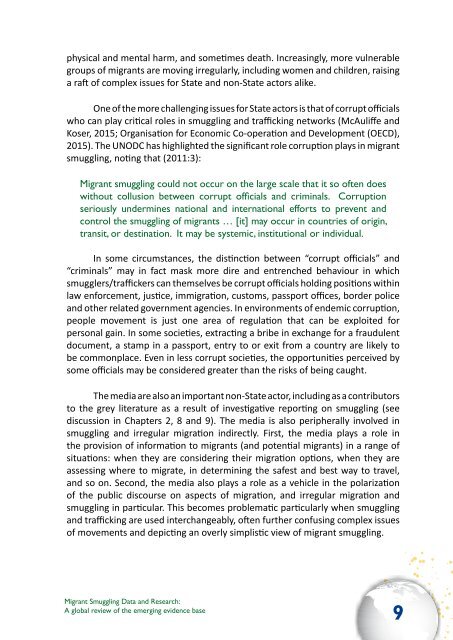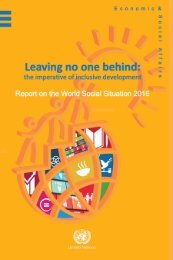- Page 1 and 2: Migrant Smuggling Data and Research
- Page 3: Migrant Smuggling Data and Research
- Page 6 and 7: on migrant smuggling and irregular
- Page 8 and 9: Trafficking (UN.GIFT) and a member
- Page 10 and 11: Marie McAuliffe is the newly appoin
- Page 12 and 13: Ramesh Sunman is a research officer
- Page 15 and 16: 1 REPORT OVERVIEW Marie McAuliffe a
- Page 17 and 18: disrupt the activities of migrant s
- Page 19 and 20: Financial motives are central to th
- Page 21: Complexities of smuggling Part of t
- Page 25 and 26: Probably the best data available re
- Page 27 and 28: Finally, it could be argued that co
- Page 29 and 30: (chapter 2), grey literature “ref
- Page 31 and 32: on aspects of migrant smuggling, in
- Page 33 and 34: References commonplace than is read
- Page 35 and 36: International Organization for Migr
- Page 37 and 38: Regional Mixed Migration Secretaria
- Page 39 and 40: Introduction 2 WEST AND CENTRAL AFR
- Page 41 and 42: Map 2.1: Map of West and Central Af
- Page 43 and 44: distances in sparsely populated are
- Page 45 and 46: down by nationality. 6 These entrie
- Page 47 and 48: Figure 2.1: Asylum applications lau
- Page 49 and 50: qualitative data often contain deta
- Page 51 and 52: Investigative journalism A substant
- Page 53 and 54: and terrorism are mentioned in the
- Page 55 and 56: Ethnographic research and policy re
- Page 57 and 58: Conclusion and ways forward Migrati
- Page 59 and 60: Altai Consulting 2013 Mixed Migrati
- Page 61 and 62: 2007b Unauthorized migration from A
- Page 63 and 64: Global Initiative Against Transnati
- Page 65 and 66: Marie, C.-V. 2004 Preventing Illega
- Page 67: Triulzi, A. 2013 “Like a plate of
- Page 70 and 71: Table 3.1: Signatories of the Proto
- Page 72 and 73:
smuggling, most of which focus on S
- Page 74 and 75:
Somalia, Eritrea, Ethiopia and Djib
- Page 76 and 77:
Smuggler services and networks The
- Page 78 and 79:
not view themselves as victims of a
- Page 80 and 81:
to air travel. Although travelling
- Page 82 and 83:
identified along the routes to the
- Page 84 and 85:
collecting data on irregular migrat
- Page 86 and 87:
Remaining data available online inc
- Page 88 and 89:
informant interviews and in-depth i
- Page 90 and 91:
• Risk of abduction and trafficki
- Page 92 and 93:
human trafficking, but also inform
- Page 94 and 95:
De Regt, M. and M. Tafesse 2015 Dep
- Page 96 and 97:
2013a Health Vulnerabilities Study
- Page 98 and 99:
United Nations High Commissioner fo
- Page 100 and 101:
Mediterranean routes passing throug
- Page 102 and 103:
The dynamics of smuggling As seen i
- Page 104 and 105:
Key locations There is much to sugg
- Page 106 and 107:
smuggler once in the destination co
- Page 108 and 109:
increased between 2014 and 2015, wh
- Page 110 and 111:
Figure 4.2: Irregular arrivals on t
- Page 112 and 113:
In terms of research focused on smu
- Page 114 and 115:
perspective of the migration dynami
- Page 116 and 117:
Global Initiative against Transnati
- Page 118 and 119:
Reitano, T., L. Adal and M. Shaw 20
- Page 120 and 121:
of Unauthorized Entry and Residence
- Page 122 and 123:
(c) Eastern Mediterranean route, fr
- Page 124 and 125:
nationals of UNSC resolution 1244-a
- Page 126 and 127:
Figure 5.1: Smuggling routes into a
- Page 128 and 129:
Travel by air through falsified doc
- Page 130 and 131:
Czech Republic, for instance, do no
- Page 132 and 133:
Next to the lack of comparable and
- Page 134 and 135:
of Austria (FPG), n.d.; Federal Act
- Page 136 and 137:
smuggling within the wider frame of
- Page 138 and 139:
critique, as the overall number rem
- Page 140 and 141:
Inadequate attention is currently a
- Page 142 and 143:
Bilger, V., M. Hoffmann and M. Jand
- Page 144 and 145:
Europol 2011 Illegal immigrant smug
- Page 146 and 147:
Harding, L. (and agencies) 2015 Hun
- Page 148 and 149:
Médecins sans Frontières (MSF) 20
- Page 150 and 151:
Legislation 2004 Federal Aliens Law
- Page 152 and 153:
What makes migrant smuggling more c
- Page 154 and 155:
In recent years, Turkey has also ma
- Page 156 and 157:
Although the apprehension statistic
- Page 158 and 159:
Figure 6.1: Migrant routes in the M
- Page 160 and 161:
Review of data on migrant smuggling
- Page 162 and 163:
The Turkish Criminal Code (Article
- Page 164 and 165:
Regarding mixed survey methods usin
- Page 166 and 167:
4 April 2016 in line with the bilat
- Page 168 and 169:
Baldwin-Edwards, M. 2006 Between a
- Page 170 and 171:
İçduygu, A. and D.B. Aksel 2012 I
- Page 172 and 173:
Kirişçi, K. 2003 The Question of
- Page 174 and 175:
Wissink, M., F. Düvell and A. van
- Page 176 and 177:
esponse to the demand for migration
- Page 178 and 179:
(though it should be noted that a c
- Page 180 and 181:
Map 7.1: Afghan migration flows to
- Page 182 and 183:
emaining relatives with remittances
- Page 184 and 185:
Services to Europe include meetings
- Page 186 and 187:
Sediqqi said.” This discourse ill
- Page 188 and 189:
in Quetta 75 was specifically on tr
- Page 190 and 191:
• Number of departures from Afgha
- Page 192 and 193:
of government-funded research on mo
- Page 194 and 195:
First, serious thought needs to be
- Page 196 and 197:
Department of Immigration and Citiz
- Page 198 and 199:
Koser, K. and P. Marsden 2013 Migra
- Page 200 and 201:
Triandafyllidou, A. and T. Maroukis
- Page 202 and 203:
In destination countries, migrant s
- Page 204 and 205:
Overview of migrant smuggling in th
- Page 206 and 207:
Some irregular migrants from Bangla
- Page 208 and 209:
Costs to migrants Financial costs o
- Page 210 and 211:
Figure 8.3: Smuggling as a set of b
- Page 212 and 213:
Ultimately, the data that is collec
- Page 214 and 215:
Review of migrant smuggling researc
- Page 216 and 217:
(2012) investigated “entrepreneur
- Page 218 and 219:
the spike in irregular migration fr
- Page 220 and 221:
Davin, E. and N. Majidi 2009 Study
- Page 222 and 223:
McAuliffe, M. 2013 Seeking the view
- Page 224 and 225:
United Nations High Commissioner fo
- Page 226 and 227:
This conceptualization has been evi
- Page 228 and 229:
The growing profile of migrant smug
- Page 230 and 231:
For example, Malaysia currently hos
- Page 232 and 233:
Lyneham, 2014). The following case
- Page 234 and 235:
The summary of data contained in th
- Page 236 and 237:
The transnational criminal focus ap
- Page 238 and 239:
Data on smuggling of asylum seekers
- Page 240 and 241:
Data on abuse, exploitation and dea
- Page 242 and 243:
Given extremely limited household i
- Page 244 and 245:
Australia. The remaining research w
- Page 246 and 247:
elsewhere in the region appears to
- Page 248 and 249:
Barron, L. and W. Lone 2015 Myanmar
- Page 250 and 251:
MacKinnon, I. 2008 54 Burmese migra
- Page 252 and 253:
United Nations Office of Drugs and
- Page 254 and 255:
A.T. Gallagher (2015), “Exploitat
- Page 257 and 258:
10 NORTH-EAST ASIA Jiyoung Song Int
- Page 259 and 260:
The following sections provide the
- Page 261 and 262:
Figure 10:1: Destination countries
- Page 263 and 264:
a three-tiered structure: (a) “bi
- Page 265 and 266:
Problems with accessibility Given t
- Page 267 and 268:
smugglers as criminals have evolved
- Page 269 and 270:
2003; Li, 2012; Silverstone, 2011).
- Page 271 and 272:
not to be dominant in the region. N
- Page 273 and 274:
Human Rights Watch 2002 The Invisib
- Page 275 and 276:
Lohman, D. 1996 North Korea: A Pote
- Page 277 and 278:
n.d. Voluntary Reporting System on
- Page 279 and 280:
庄 国 土 1997 对 近 20 年 来
- Page 281:
李 琦 . 2011 吉 林 中 朝 边
- Page 284 and 285:
travel documents from friends and f
- Page 286 and 287:
and 2011). This chapter provides an
- Page 288 and 289:
journalistic reports suggest many o
- Page 290 and 291:
Some Cuban nationals and residents
- Page 292 and 293:
north, but also within the continen
- Page 294 and 295:
migration flows. In terms of offici
- Page 296 and 297:
esearch has also emerged on the top
- Page 298 and 299:
the region in a fashion that may al
- Page 300 and 301:
migratory corridor. Brigden (2015)
- Page 302 and 303:
security mechanisms, efforts to eng
- Page 304 and 305:
Casillas, R. 2007 Una Vida Discreta
- Page 306 and 307:
Evans, M. and J. Franzblau (eds.) 2
- Page 308 and 309:
Jackson, J. 2015 Crossing the Darie
- Page 310 and 311:
Moreno Mena, J.A. and L. Niño Cont
- Page 312 and 313:
Robinson, B. 2010 Smuggled Masses:
- Page 314 and 315:
2013 Children on the Run: Unaccompa
- Page 317 and 318:
12 THE UNITED STATES Sheldon X. Zha
- Page 319 and 320:
a long history of admitting large n
- Page 321 and 322:
During the 1980 and 1990s, Chinese
- Page 323 and 324:
Migrant smuggling in San Diego San
- Page 325 and 326:
Mexican Migration Project (MMP) Sur
- Page 327 and 328:
Migration, either regular or irregu
- Page 329 and 330:
Once migrant smuggling is framed as
- Page 331 and 332:
In a market environment where goods
- Page 333 and 334:
Most policymakers as well as border
- Page 335 and 336:
Cornelius, W.A. and J.M. Lewis (eds
- Page 337 and 338:
Roberts, B. et al. 2010 An Analysis
- Page 340:
17 route des Morillons, P.O. Box 17
















